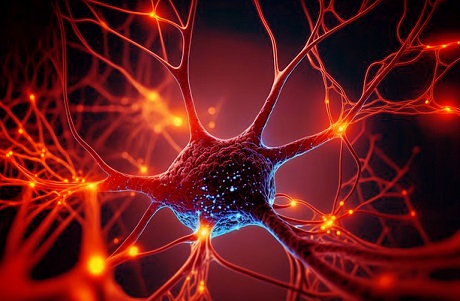Nikhil Prasad Fact checked by:Thailand Medical News Team Nov 29, 2024 4 months, 2 weeks, 3 days, 6 hours, 51 minutes ago
Medical-News: COVID-19, caused by the SARS-CoV-2 virus, is commonly associated with respiratory and systemic symptoms, but growing evidence highlights its effects on the brain. A recent study conducted by American researchers from Oregon Health & Science University (OHSU), the Cleveland Clinic Foundation, and Case Western Reserve University delves into how exposure to COVID-19 virus-like particles (VLPs) impacts the brain. This research, focusing on mouse models, provides groundbreaking insights into how SARS-CoV-2 proteins disrupt neuronal activity in the cerebral cortex.
 American Murine Study Finds That SARS-CoV-2 Disrupts Brain Neuron Activity
American Murine Study Finds That SARS-CoV-2 Disrupts Brain Neuron Activity
This
Medical News report unpacks the study's findings and explains why they matter for understanding COVID-19's neurological impact.
How Virus-Like Particles Were Used in the Study
The study utilized VLPs - synthetic particles that mimic the SARS-CoV-2 virus but lack infectious genetic material. These particles allowed researchers to safely explore the immune and neurological effects of COVID-19 in mice. Specifically, they studied how VLP exposure influenced neurons in the motor and somatosensory cortices of the brain, regions critical for movement and sensory processing.
The research team used advanced imaging techniques, such as two-photon laser scanning microscopy, to observe changes in neuronal activity over six weeks. By doing so, they captured both short-term and long-term effects of VLP exposure on the brain.
Key Findings: Immune Response and Brain Disruption
-Immune System Activation
The researchers injected mice with varying doses of VLPs and observed a robust immune response. Plasma levels of stress hormones like corticosterone increased, along with chemokines such as CCL7, which signal inflammation. These effects were dose-dependent, with higher VLP doses eliciting stronger immune reactions.
-Short-Term Effects on Neurons
One hour after VLP exposure, there was a marked increase in the activity of neurons in both the motor and somatosensory cortices. Stimulus-evoked activity metrics surged by up to 420% in normal mice (wild-type or WT) and up to 363% in genetically modified mice expressing human tau protein (htau mice). The tau protein is associated with Alzheimer’s disease, making these mice more vulnerable to neurological disruptions.
Interestingly, htau mice also exhibited heightened spontaneous activity, a phenomenon not observed in WT mice. This suggests that the tau protein increases the brain's susceptibility to inflammation and stress triggered by VLPs.
-Long-Term Effects: Residual Changes in Brain Function
Over the following weeks, neuronal activity in WT mice gradually subsided but remained elevated compared to baseline. In contrast, htau mice displayed erratic patterns of increased and decreased neuronal activity. This instability could be
linked to the tau protein’s role in neurodegeneration, further highlighting how preexisting conditions may amplify the brain's response to COVID-19 proteins.
Why These Findings Matter
This study sheds light on how COVID-19 affects the brain, even without direct viral infection. It highlights that:
-SARS-CoV-2 proteins can disrupt brain function: The immune response to these proteins triggers widespread changes in cortical neuron activity.
-People with neurological vulnerabilities may be at higher risk: Conditions like Alzheimer’s disease or genetic predispositions could make individuals more susceptible to COVID-19's long-term neurological effects.
-Inflammation plays a key role: The study emphasizes the link between systemic inflammation and changes in brain activity, which could contribute to symptoms of "long COVID," such as brain fog and memory loss.
Broader Implications for Human Health
While this research was conducted on mice, it offers valuable clues about how COVID-19 may affect humans. Many COVID-19 survivors report lingering neurological symptoms, such as fatigue, difficulty concentrating, and mood changes. This study suggests that these symptoms could stem from sustained disruptions in cortical neuronal activity caused by the immune system’s response to SARS-CoV-2 proteins.
Moreover, the use of VLPs in this research underscores their potential as a tool for studying other neurological diseases. By isolating the effects of specific viral proteins, scientists can better understand how pathogens impact brain health.
Conclusions
The study concludes that systemic exposure to SARS-CoV-2 proteins significantly alters brain function. In normal mice, these changes are pronounced but eventually stabilize. However, in mice with genetic vulnerabilities (htau mice), the effects are more severe and persistent, suggesting a heightened risk for individuals with neurodegenerative conditions.
These findings are a reminder of the intricate connections between the immune system and brain health. They also highlight the need for continued research into the neurological impacts of COVID-19, particularly for at-risk populations.
The study findings were published on a preprint server and are currently being peer reviewed.
https://www.biorxiv.org/content/10.1101/2024.11.26.625543v1
For the latest COVId-19 News, keep on logging to Thailand
Medical News.
Read Also:
https://www.thailandmedical.news/news/sars-cov-2-infects-ipsc-derived-neurons-and-causes-brain-degeneration-with-cathepsin-b-playing-a-crucial-role-in-viral-entry
https://www.thailandmedical.news/news/sars-cov-2-nsp7-protein-impairs-synaptic-plasticity-in-the-brain-leading-to-memory-loss
https://www.thailandmedical.news/news/zinc-sulfate-may-block-covid-19-brain-invasion
https://www.thailandmedical.news/articles/coronavirus
Follow us on:
https://x.com/ThailandMedicaX
https://bsky.app/profile/thailandmedical.bsky.social
https://gettr.com/user/thailandmedicalnews
https://www.facebook.com/ThailandMedicalNews
